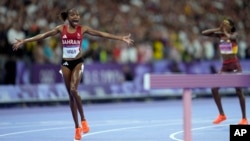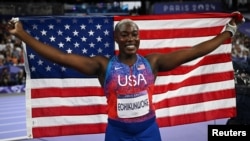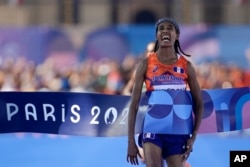As Africa’s Olympic athletes come home from Paris, the continent’s sports fans can’t help but wonder what might have been. While African countries claimed dozens of medals in Paris, several African-born-and-raised athletes won gold for other countries.
Experts warn that a lack of investment in sports and other issues could prompt more African athletes to switch nationalities.
African teams won 38 medals at the Paris Olympics. Kenya won the most with 11.
But Kenya could have claimed another gold had one of its athletes not chosen to represent Bahrain. Winfred Yavi won gold in the women’s 3,000-meter steeplechase and even broke the Olympic record.
Yavi told Kenyan media that she changed her nationality in 2014 after failing to get picked for the Kenyan team on several attempts.
Her coach Gregory Kilonzo, who coaches other athletes from Bahrain, told VOA there are many incentives that can lead an athlete to represent another country.
"Here in Bahrain, we go directly to the Olympics. We don't go for trials because we are not many,” Kilonzo said. “Kenya, we go national, we go trials. And then Bahrain pays well. They are serious with their athletes. They take care of their athletes. They pay salaries for the athletes every month. If you get sick, they take you to other countries for medical care."
Hammer thrower Annette Echikunwoke was denied a chance to represent Nigeria at the 2020 Tokyo Games because of the country’s non-compliance with drug testing requirements. This year, she competed for the United States and earned a silver medal.
Meanwhile, Nigerian athletes competed in 12 events in Paris and returned home without a single gold, silver or bronze. Nigerian officials apologized for the dismal performance and said they will review how people are elected to lead the sporting federation.
Other athletes have left Africa to escape poverty, violence or political oppression. Sifan Hassan, an Ethiopian native, fled her country as a refugee and settled in the Netherlands in 2008. She has since won three Olympic golds for her country, including the women’s marathon Sunday in Paris.
African athletes who have changed allegiance have complained of a lack of good sporting facilities that cater to their training needs, a lack of good pay and corrupt officials favoring some athletes over others.
Richard Wanjohi is a researcher with the African Sports and Creative Institute, an organization that supports African sports through research, advisory and advocacy. He said the trend of African athletes abandoning their birth countries creates concerns that may affect African performance in future competitions, particularly if they lose young athletes.
“You see people transitioning maybe between the age of 18 to 21 years, and that's considerably young even in the athletics space and other sporting disciplines that they compete in,” he said, adding that that creates a loss of talent nationally. “Once these individuals move, you are not able to get representation as a country. Or even when you have representation, [it] is not the best talent you would have."
To prevent promising athletes from leaving, sports fans on the continent want officials to spot talent among school-age children and give them the training they need to compete on the global stage.
Some observers say African countries also need to invest in sports science and technology. To date, most countries have relied on natural advantages such as East Africa’s high altitude to train its athletes.
Retired middle-distance runner Martin Keino of Kenya said such methods may not work in the future.
"If our countries can invest in sports science and technology — because technology has a huge impact on sports — and if a nation doesn't utilize technology, you are uncompetitive on the global stage,” Keino said.
If Africa fails to harness the power of sports science, Keino said, African athletes will fail to win medals, and may not even make it to the finals.






